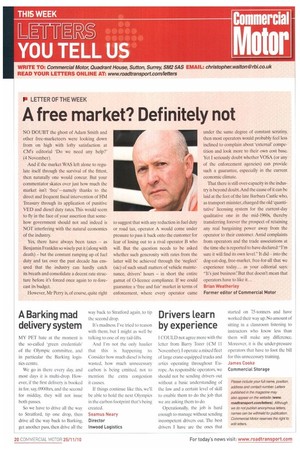P LETTER OF THE WEEK
Page 20

If you've noticed an error in this article please click here to report it so we can fix it.
A free market? Definitely not
NO DOUBT the ghost of Adam Smith and other free-marketeers were looking down from on high with lofty satisfaction at CM's editorial 'Do we need any help?' (4 November).
And if the market WAS left alone to regulate itself through the survival of the fittest, then naturally one would concur. But your commentator skates over just how much the market isn't 'free' — namely thanks to the direct and frequent fiscal intervention of HM Treasury through its application of punitive VED and diesel duty rates. This would seem to fly in the face of your assertion that somehow government should not and indeed is NOT interfering with the natural economics of the industry.
Yes, there have always been taxes as Benjamin Franklin so wisely put it (along with death) but the constant ramping up of fuel duty and tax over the past decade has ensured that the industry can hardly catch its breath and consolidate a decent rate structure before it's forced once again to re-forecast its budget.
However, Mr Perry is, of course, quite right to suggest that with any reduction in fuel duty or road tax, operator A would come under pressure to pass it back onto the customer for fear of losing out to a rival operator B who will. But the question needs to be asked whether such generosity with rates from the latter will be achieved through the 'neglect' (sic) of such small matters of vehicle maintenance, drivers' hours in short the entire gamut of 0-licence compliance. If we could guarantee a 'free and fair' market in terms of enforcement, where every operator came under the same degree of constant scrutiny, then most operators would probably feel less inclined to complain about `external' competition and look more to their own cost base. Yet I seriously doubt whether VOSA (or any of the enforcement agencies) can provide such a guarantee, especially in the current economic climate.
That there is still over-capacity in the industry is beyond doubt. And the cause of it can be laid at the feet of the late Barbara Castle who, as transport minister, changed the old 'quantitative' licensing system for the current-day qualitative one in the mid-1960s, thereby transferring forever the prospect of retaining any real bargaining power away from the operator to their customer. Amid complaints from operators and the trade associations at the time she is reported to have declared: 'I'm sure it will find its own level." It did into the dog-cat-dog, free-market, free-for-all that we experience today... as your editorial says: "It's just business'.' But that doesn't mean that operators have to like it...
Brian Weatherley Former editor of Commercial Motor




































































































































